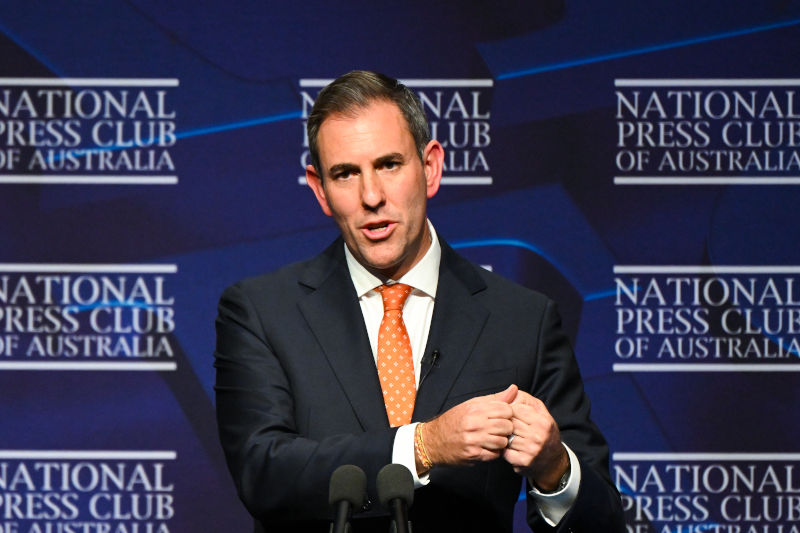Slowly changing the trajectory?
June 3, 2023
At the post-budget Press Club lunch, Treasurer Chalmers made a telling comment about the meaning of social security and, by extension, the role of government.
Responding to Shadow Treasurer Taylors concerns that the broader community would be funding the governments social security measures, Chalmers happily pointed out the bleeding obvious, namely that the idea that the broader Australian community would be funding help for the most vulnerable. is the whole basis of social security.
This is a major shift from the neoliberal language of lifters and leaners. Chalmers is actually using the language of mutual support and redistribution, claiming, quite correctly, that this is the whole basis of a social security system.
We cant eat words, and many of us are deeply disappointed that Budget 2023 did not deliver a more substantial increase to JobSeeker. If, however, we are interested in how social change happens and how we might collectively help it along, we would be mistaken to be dismissive of the treasurers reframing of poverty and power.
It takes a long time to turn the neoliberal ship of state around, to transform the state apparatus from being primarily a means of propping up the already powerful into a vehicle for achieving our collective dreams. It takes a long time to displace a philosophy of greed with an aspiration for fairness.
In this years Budget we have seen a change in direction, modest in its making but, let us hope, bold in its trajectory.
Weve seen a change of direction with the long-overdue change to eligibility for parenting payments and the consignment of the punitive, disempowering, ParentsNext Program to the dustbin of history.
Increasing the pay of low-paid aged care workers by 15%, cheaper medicines, cheaper childcare, 300,000 additional fee-free TAFE places, an expansion of the public sector workforce by 10,000, investment in Medicare and public health and in social and affordable housing, along with a commitment to reform the heavily privatised employment services sector, the establishment of the Net Zero Authority and a staunch commitment to a First Nations Voice to Parliament all of these measures are signs of a turning away from neoliberal vandalism.
The government must be encouraged to continue on this path, away from neoliberal cruelty and towards a society where no one is left out or locked out. And this means theres obviously much that still needs to be done.
It means ensuring that corporations and high wealth individuals pay their fair share of tax, while changing unfair Effective Marginal Tax Rates. It means embracing a full employment framework, building social infrastructure, massively boosting public housing, addressing eligibility for the disability support pension, and increasing the base rates of JobSeeker and related working age payments to 90% of the aged pension, as per the key recommendation of the governments Economic Inclusion Advisory Committee.
Weve seen a very modest and inadequate step in the direction of addressing the latter urgent need. But in the meantime, in permitting this gaping hole in an otherwise positive budget, we are also permitting the persistence of poverty and, especially for younger people, the very real risk of losing hope.
Social security is something we should be proud of. It is how we collectively ensure that we all get the help we need from each other. As theorist Judth Butler reminds us, our lives are …always in some ways in the hands of the other. From the moment we are born we need help from others. We need help when we are young, when we are old, when a crisis hits, when we are not in paid work or not receiving enough income from paid work. We need help when we are engaged in the unpaid and heavily gendered work of caring. We need help so that we can give help. Neoliberal ideology tried to convince us that there is something shameful about needing help, that dignity equals self-reliance. But the so-called self-reliance being peddled by the purveyors of this ideology was really only ever about the commodification of every corner of our lives, the notion that you should personally pay for whatever you use. Our social security system, and social infrastructure in general, including Medicare and public health, are built on the very different principle of each of us contributing what we are able and using what we need. Which is why the Treasurer is right in framing the social security system as he has. And which is also why this framing signals a real potential for a change of trajectory away from neoliberal individualism.
Poverty is primarily a form of disempowerment. When we stand together and take action to achieve social change, as with the union movements recent historic achievement of an increase of 8.6% for minimum wage workers and 5.75% for award workers, we are exercising collective power as well as collective care for each other. Social infrastructure should also be viewed through this lens; not as largesse, not as clever policy cooked up in isolation from reality, but as a concrete affirmation of the collective power we have as a society, by pooling some of our resources, to ensure that each of us gets to enjoy the essentials of life.
